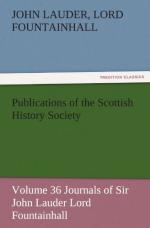[Sidenote: H.O. 148]
[Sidenote: H.O. 6]
[Sidenote: Decisions, p. 232.]
I shall cite some passages in illustration. When Charles II. died and James was proclaimed, Lauder writes that ’peoples greiff was more than their joy, having lost their dearly loved king’; then after a gentle reference to ’his only weak syde,’ he says, ’he was certainly a prince indued with many Royall qualities, and of whom the Divine providence had taken a speciall care by preserving him after Worcester fight in the oak.’ ... ’A star appeared at noon day at his birth; he was a great mathematician, chemist, and mechanick, and wrought oft in the laboratories himselfe; he had a natural mildnesse and command over his anger, which never transported him beyond an innocent puff and spitting, and was soon over, and yet commanded more deference from his people than if he had expressed it more severely, so great respect had all to him. His clemencie was admirable, witnesse his sparing 2 of Oliver Cromwell’s sones, tho on of them had usurped his throne. His firmnesse in religion was evident; for in his banishment he had great invitations and offers of help to restore him to his croun if he would turne Papist, but he always refused it. As for his brother James, now our present King, he is of that martiall courage and conduct, that the great General Turenne was heard say, if he ware to conquer the world, he would choise the Duke of York to command his army,’ Such were Lander’s loyal sentiments, as set down in a private journal a year before his servants and clerks were arrested, and the seizure of his papers threatened. But his Protestantism and his jealousy of Popery were equally strong. In 1680 he notes that the minister of Wells in Nithsdale had ’turned Roman Catholic: so this is one of the remarkable trophees and spoils the Papists are beginning to gain upon our religion.’ A little further on he is indignant at ridicule being thrown on the Popish Plot ’Not only too many among ourselves, but the French, turned the Plot into matter of sport and laughter: for at Paris they acted in ther comedy, called Scaramucchio, the English tryall, and busked up a dog in a goune lik Chief Justice Scrogs.’ Again, ‘A Papist qua Papist cannot be a faithful subject,’ He had, however, no sympathy with the Covenanters, a name which he does not use, but he describes them as ‘praecise phanaticks.’ He did not consider it unjust to bring them to capital punishment, because they denied the right of the king to govern, though on grounds of humanity and policy he was inclined to mercy. In 1682 he observes on the execution of Alexander Home, a small gentleman of the Merse, who had commanded a party at the insurrection of Bothwell Bridge, ‘tho he came not that lenth,’ ’It was thought ther was blood eneuch shed on that quarrell already ... for they are like Sampson, they kill and persuade mo at ther death than they did in ther life.’ He couples the Roman Catholics and Presbyterians together




